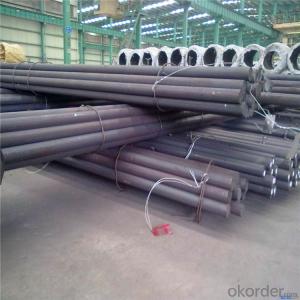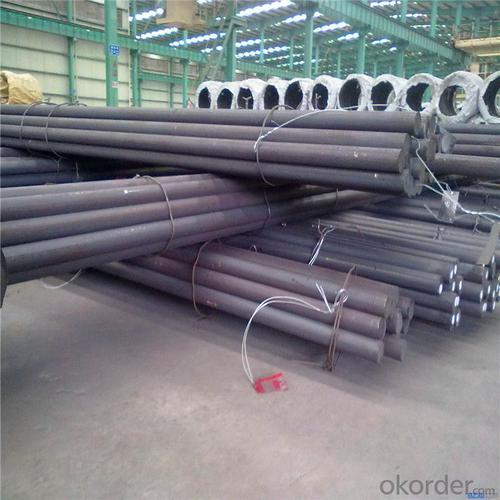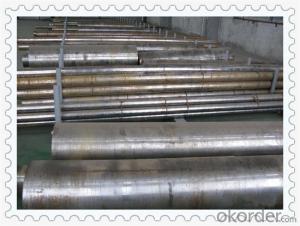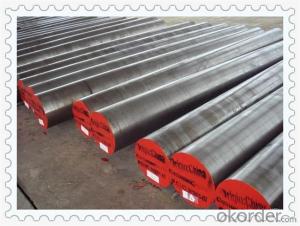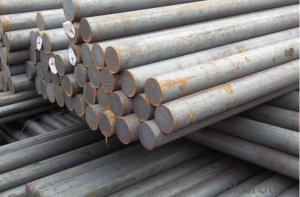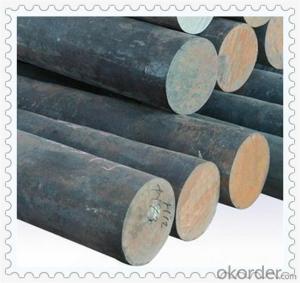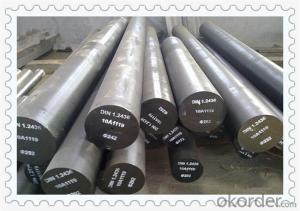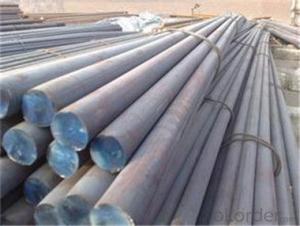Forged Pre-harden AISI 4340 Steel Round Bars Supplier
- Loading Port:
- Tianjin
- Payment Terms:
- TT OR LC
- Min Order Qty:
- 100 m.t.
- Supply Capability:
- 500000 m.t./month
OKorder Service Pledge
OKorder Financial Service
You Might Also Like
Specification
Forged Pre-harden AISI 4340 Steel Round Bars Supplier
Product Description of Forged Pre-harden AISI 4340 Steel Round Bars Supplier
1. Steel grade: ASTM4140, SCM440, 42CrMo, DIN1.7225
2. Length: 6M-12M
3. Diameter: 16mm-300mm
4. Product range: round bar, flat bar, square bar
5. Technique: Hot rolled, forged, cold drawn
Specification of Forged Pre-harden AISI 4340 Steel Round Bars Supplier
Material | SCM4140 | Round bar | Dia(mm) | 16-300mm |
Process | EAF + LF + VD + Forged + Heat Treatment (optional) | Length (mm) | Max 12m | |
Heat treatment | Normalized / Annealed / Quenched / tempered | Flat bar | Thickness(mm) | 8-500mm |
Delivery condition | Hot forged +Rough machined (black surface after Q/T)+ Turned (optional) | Width(mm) | 70-200mm | |
Test | Ultrasonic test according to SEP 1921-84 D/d | Length (mm) | Max 12m |
Chemical Composition of Forged Pre-harden AISI 4340 Steel Round Bars Supplier
C | Si | Mn | Cr | Mo | P | S |
0.38~0.43 | 0.15~0.35 | 0.75~1.00 | 0.8~1.1 | 0.15~0.25 | ≤0.035 | <0.04< td=""> |
Photo Show of Forged Pre-harden AISI 4340 Steel Round Bars Supplier
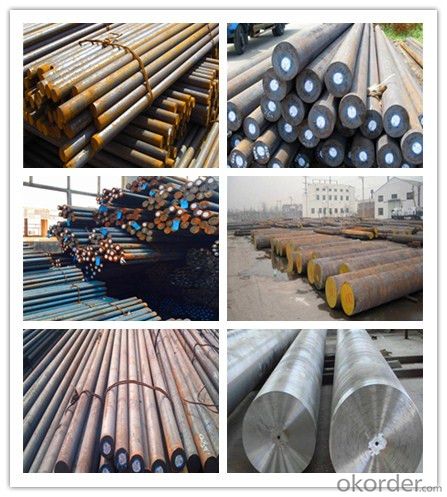
Packing and Delivery:
Packing in bundle package, or as customer's requirements.
Delivery Detail: 45 days after receiving the deposit.
Usage and Applications of Forged Pre-harden AISI 4340 Steel Round Bars Supplier
1. Steel round bar is used in a large number of architectural and engineering structures. Or it can be used in construction of plants for the production of steel house frames, high-voltage transmission towers, bridges, vehicles, boilers, containers, ships, etc.
2. And we can use this kind of product on the performance of the mechanical parts if the demand is not very high.
3. Some special material steel round bar can be used for main shaft of steamer, hummer shank, with big section and supper force.
Company Information
CNBM International Corporation is the most important trading platform of CNBM group.
Whith its advantages, CNBM International are mainly concentrate on Cement, Glass, Iron and Steel, Ceramics industries and devotes herself for supplying high qulity series of refractories as well as technical consultancies and logistics solutions.


F A Q
1, Your advantages?
professional products inquiry, products knowledge train (for agents), smooth goods delivery, excellent customer solution proposale
2, Test & Certificate?
SGS test is available, customer inspection before shipping is welcome, third party inspection is no problem
3, Factory or Trading Company?
CNBM is a trading company but we have so many protocol factories and CNBM works as a trading department of these factories. Also CNBM is the holding company of many factories.
4, Payment Terms?
30% TT as deposit and 70% before delivery.
Irrevocable L/C at sight.
5, Trading Terms?
EXW, FOB, CIF, FFR, CNF
6, After-sale Service?
CNBM provides the services and support you need for every step of our cooperation. We're the business partner you can trust.
For any problem, please kindly contact us at any your convenient time.
We'll reply you in our first priority within 24 hours.
- Q: What is the difference between a hot rolled and a turned steel round bar?
- A hot rolled steel round bar is produced by heating the steel billet to high temperatures and then rolling it into its final shape, resulting in a rough surface finish. On the other hand, a turned steel round bar is produced by machining the steel bar using a lathe, which creates a smooth and polished surface finish.
- Q: What are the advantages of using duplex steel round bars?
- Duplex steel round bars offer numerous benefits for various applications. Firstly, they provide exceptional resistance to corrosion. By combining chromium, nickel, and molybdenum, this steel can withstand harsh conditions found in marine and chemical industries. This makes it ideal for high exposure to corrosive elements. Secondly, duplex steel round bars possess great strength and toughness. The unique microstructure of this steel, combining ferrite and austenite phases, results in greater strength compared to traditional stainless steels. This makes them suitable for demanding applications requiring high load-bearing capacities. Additionally, duplex steel round bars exhibit excellent fatigue resistance. This makes them perfect for applications subjected to cyclic loading or dynamic stress, such as structural components or machinery parts. Their fatigue resistance allows for extended service life and reliability. Another advantage of using duplex steel round bars is their superior weldability. Their balanced chemical composition and microstructure enable easy fabrication and joining, reducing production time and costs in various industries. Furthermore, duplex steel round bars demonstrate exceptional resistance to stress corrosion cracking (SCC). This makes them a preferred choice for applications with a high risk of SCC, such as offshore and oil and gas industries. Lastly, duplex steel round bars provide cost-effective solutions. Despite their superior properties, they are often more cost-effective than other high-performance materials. Their long service life, reduced maintenance requirements, and overall durability contribute to lower lifecycle costs, making them an economical choice for various applications. In conclusion, duplex steel round bars offer excellent corrosion resistance, high strength and toughness, good fatigue resistance, superior weldability, resistance to stress corrosion cracking, and cost-effectiveness. These properties make them a preferred choice for industries such as oil and gas, chemical processing, marine, and structural applications.
- Q: How many grades of steel are round steel?
- Secondly, the round steel only shows the shape of steel, all kinds of steel have round steel, it can not explain the nature and composition of steel.
- Q: How do you prevent rusting of steel round bars?
- To prevent rusting of steel round bars, it is essential to apply protective coatings such as paint, epoxy, or galvanization. Regularly cleaning the bars and keeping them dry, particularly in humid environments, can also help prevent rust formation. Additionally, storing the bars in a controlled indoor environment or using moisture-absorbing materials like silica gel packets can further prevent rusting.
- Q: What are the common sizes and dimensions of steel round bars?
- Different applications and requirements dictate the availability of steel round bars in a range of sizes and dimensions. The most prevalent sizes and dimensions for steel round bars encompass diameters spanning from 1/4 inch to 24 inches. These diameters correspond to the nominal size of the round bar, which approximates its cross-sectional diameter. Concerning dimensions, standard lengths of 20 feet or 6 meters are typically available for steel round bars. However, custom lengths can be manufactured upon request. The length of the round bar plays a crucial role as it determines the amount of material accessible for cutting, shaping, and fabrication. Furthermore, the weight of steel round bars may differ based on their size. Steel is typically evaluated by its weight per unit length, commonly specified in pounds per foot or kilograms per meter. The weight of a steel round bar is influenced by its diameter, length, and the specific type of steel employed. It should be noted that the aforementioned sizes and dimensions are industry standards, but there may be variations depending on the particular manufacturer or supplier. Hence, it is always advisable to consult the manufacturer's catalog or directly contact them to obtain accurate and up-to-date information regarding the sizes and dimensions of the steel round bars they offer.
- Q: What are the applications of steel round bars in the aerospace industry?
- Due to their exceptional strength, durability, and versatility, steel round bars are extensively utilized in the aerospace industry. These bars find application in various areas, including the following: 1. Structural Components: In the production of structural components in the aerospace industry, steel round bars are commonly employed. Aircraft frames, landing gear, wing spars, and other critical structural elements are manufactured using these bars. Steel's high tensile strength guarantees the structural integrity and safety of the aircraft. 2. Fasteners: Fasteners such as bolts, screws, and pins are produced using steel round bars. These fasteners play a crucial role in holding different parts of the aircraft together. Steel's strength and resistance to fatigue make it the ideal material for these vital connections. 3. Engine Components: Various engine components are manufactured using steel round bars. Shafts, crankshafts, connecting rods, and turbine blades are among the components that benefit from the use of these bars. These components need to withstand high temperatures, pressure, and mechanical stress, and steel's heat resistance and strength make it suitable for these demanding conditions. 4. Landing Gear: The landing gear of an aircraft experiences immense stress during takeoff, landing, and taxiing. Steel round bars are used in the construction of landing gear components such as axles and struts. The high strength and toughness of steel ensure the landing gear's ability to withstand the forces encountered during landing operations. 5. Tooling and Fixtures: Tooling and fixtures necessary for the production and maintenance of aircraft are manufactured using steel round bars. These tools and fixtures are utilized in various processes, including machining, assembly, and inspection. Steel's hardness and machinability make it the ideal material for these applications. In conclusion, steel round bars have a wide range of applications in the aerospace industry, including structural components, fasteners, engine parts, landing gear, and tooling. The unique combination of strength, durability, and versatility offered by steel is essential in guaranteeing the performance, safety, and reliability of aerospace systems.
- Q: What is the maximum load capacity of a steel round bar?
- The maximum load capacity of a steel round bar depends on various factors, including the diameter, length, and grade of the steel. Steel round bars are designed to withstand different levels of stress and can have varying load capacities. Generally, the load capacity is determined by the yield strength and ultimate tensile strength of the steel. To determine the maximum load capacity of a specific steel round bar, it is necessary to consult engineering specifications or reference materials provided by the manufacturer. These specifications will provide the necessary information to calculate the load capacity based on the specific dimensions and properties of the round bar. It is important to note that load capacity calculations should be carried out by qualified professionals with a thorough understanding of structural engineering principles and material properties.
- Q: What is the toughness of a steel round bar?
- The toughness of a steel round bar refers to its ability to absorb energy and resist fracture when subjected to impact or sudden loads. It is a measure of its resilience and ability to withstand stress without breaking.
- Q: Are steel round bars suitable for marine environments?
- Steel round bars can be suitable for marine environments, but their suitability depends on the specific type of steel and the conditions of the marine environment. Stainless steel is often the preferred choice for marine applications because it possesses excellent corrosion resistance properties. This is due to the presence of chromium in stainless steel, which forms a protective layer on the steel's surface, preventing corrosion and rusting. However, not all steel round bars are suitable for marine environments. Carbon steel, for instance, is more vulnerable to corrosion in marine settings, especially when exposed to saltwater. To prevent corrosion, carbon steel needs to be carefully protected with coatings or treatments. In addition to the type of steel, the conditions of the marine environment also play a significant role in determining the suitability of steel round bars. Factors such as water salinity, exposure to chemicals, temperature fluctuations, and physical stress can impact steel's corrosion resistance. In highly corrosive marine environments, it is advisable to use specialized marine-grade stainless steel or other corrosion-resistant alloys. Ultimately, it is crucial to choose the appropriate steel grade and consider extra protective measures like coatings or galvanization to enhance the durability and longevity of steel round bars in marine environments.
- Q: What is the difference between a hot-rolled and a cold-drawn steel round bar?
- The manufacturing process and resulting properties distinguish a hot-rolled steel round bar from a cold-drawn one. To produce hot-rolled bars, a billet or ingot is heated to a high temperature, typically around 1100 to 1300 degrees Celsius, and then rolled into the desired shape and size. This process yields a rougher surface finish and larger tolerances compared to cold-drawn bars. Hot-rolled bars exhibit less precision in dimensions and may contain surface defects such as scale or rust. In contrast, cold-drawn bars undergo manufacturing by pulling a hot-rolled bar through a die at room temperature. This process reduces the diameter and enhances the surface finish, resulting in a smoother and more precise product. Cold-drawing also improves the mechanical properties of the steel, including increased strength, hardness, and improved surface quality. The cold-drawing process provides closer dimensional tolerances, making cold-drawn bars suitable for applications that demand higher precision. In conclusion, the distinction between hot-rolled and cold-drawn steel round bars lies in the manufacturing process, resulting in differences in surface finish, dimensional tolerances, and mechanical properties. Hot-rolled bars are produced at high temperatures, possess a rougher surface, and have larger tolerances. On the other hand, cold-drawn bars are manufactured at room temperature, exhibit a smoother surface, closer dimensional tolerances, and enhanced mechanical properties. The choice between the two depends on specific application requirements and the desired characteristics of the final product.
Send your message to us
Forged Pre-harden AISI 4340 Steel Round Bars Supplier
- Loading Port:
- Tianjin
- Payment Terms:
- TT OR LC
- Min Order Qty:
- 100 m.t.
- Supply Capability:
- 500000 m.t./month
OKorder Service Pledge
OKorder Financial Service
Similar products
Hot products
Hot Searches
Related keywords
